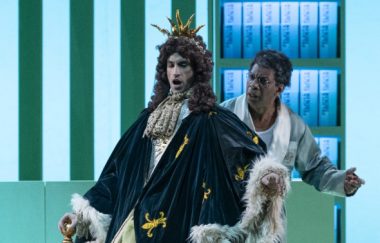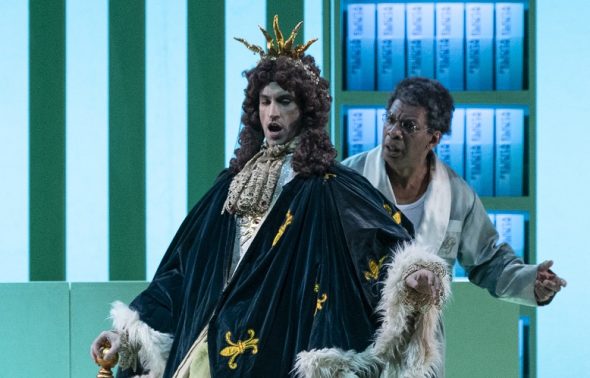 Argentina Donizetti, Il Campanello: Soloists and Orchestra of the Superior Institute of Art of the Teatro Colón / César Bustamante (conductor). Teatro Coliseo, Buenos Aires. 29.6.2023. (JSJ)
Argentina Donizetti, Il Campanello: Soloists and Orchestra of the Superior Institute of Art of the Teatro Colón / César Bustamante (conductor). Teatro Coliseo, Buenos Aires. 29.6.2023. (JSJ)

Production:
Direction – Mariana Ciolfi
Scenery – Matías Otálora
Lighting – Fabricio Ballarati
Costumes – Stella Maris Müller
Chorus – Miguel Martínez
Cast:
Don Annibale di Pistacchio – Iván García
Enrico – Felipe Carelli
Serafina – Ana Sampedro
Spiridione – Pablo Truchljak
Rosa – Guadalupe Barrientos
In what was a ‘double Donizetti’ offering from the Teatro Colón, there couldn’t have been a more striking contrast than between the short one act farsa Il Campanello and its camp production and the lengthy and dark and tragic Anna Bolena of a few days before.
Il Campanello, which dates from 1836 and the latter part of Donizetti’s compositions, is one of two giocoso works from that year (the other being Betly) interspersed between the many seria, with both remaining largely unknown today.
Its storyline, somewhat reminiscent of Rossini’s Barber of Seville, takes place on the wedding day of the elderly doctor Annibale di Pistacchio with his young bride Serafina.
Her cousin and ex suitor Enrico turns up among the guests at the party and hoping to win Serafina back, with her aunt Rosa hatches a plan which involves him returning during the night in a series of different guises with increasingly worse maladies – although not to see her but to keep the doctor away from the marital bed until the morning when he is due to depart to Rome to obtain the bequest from his aunt’s will.
The production, part of a ‘Divine Italy’ season in partnership with the Italian Embassy and the Italian Institute of Culture in Buenos Aires, involved younger performers, except for the experienced Venezuelan bass Iván García as Annibale and mezzo-soprano Guadalupe Barrientos as the aunt Rosa – both outstanding in their respective roles.
But the star was Felipe Carelli – previously unknown to me (and no biography given in the short programme) – who in the role of Enrico had to take on the different styles of the different characters and his last duet with Annibale (‘Mio signore venerato’) was a patter number that was a feat of breath control.
The production was appropriately bright and colourful with an enthusiastic chorus. But it was flawed in two aspects, the first being the need for some almost constant form of movement with at times the chorus bobbing in the background. But more significantly, while the ending as written is rather weak, for Annibale to be straightjacketed and led off while promising to see everyone on the return from his trip, cast a sadness over what was otherwise an hour of light-hearted fun.
Was the whole event a supposed fantasy? With no explanation forthcoming in the programme, this was contrary if not to the spirit but to the words of the libretto.
Jonathan Spencer Jones
